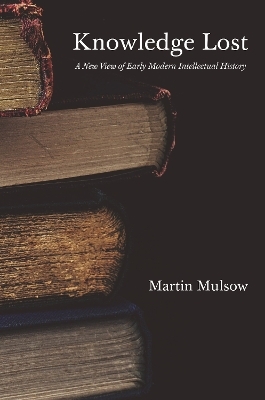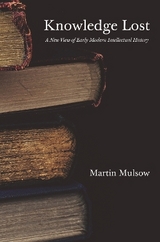Knowledge Lost
A New View of Early Modern Intellectual History
Seiten
2022
Princeton University Press (Verlag)
978-0-691-20865-7 (ISBN)
Princeton University Press (Verlag)
978-0-691-20865-7 (ISBN)
A compelling alternative account of the history of knowledge from the Renaissance to the Enlightenment
Until now the history of knowledge has largely been about formal and documented accumulation, concentrating on systems, collections, academies, and institutions. The central narrative has been one of advancement, refinement, and expansion. Martin Mulsow tells a different story. Knowledge can be lost: manuscripts are burned, oral learning dies with its bearers, new ideas are suppressed by censors. Knowledge Lost is a history of efforts, from the Renaissance to the Enlightenment, to counter such loss. It describes how critics of ruling political and religious regimes developed tactics to preserve their views; how they buried their ideas in footnotes and allusions; how they circulated their tracts and treatises in handwritten copies; and how they commissioned younger scholars to spread their writings after death.
Filled with exciting stories, Knowledge Lost follows the trail of precarious knowledge through a series of richly detailed episodes. It deals not with the major themes of metaphysics and epistemology, but rather with interpretations of the Bible, Orientalism, and such marginal zones as magic. And it focuses not on the usual major thinkers, but rather on forgotten or half-forgotten members of the “knowledge underclass,” such as Pietro della Vecchia, a libertine painter and intellectual; Charles-César Baudelot, an antiquarian and numismatist; and Johann Christoph Wolf, a pastor, Hebrew scholar, and witness to the persecution of heretics.
Offering a fascinating new approach to the intellectual history of early modern Europe, Knowledge Lost is also an ambitious attempt to rethink the very concept of knowledge.
Until now the history of knowledge has largely been about formal and documented accumulation, concentrating on systems, collections, academies, and institutions. The central narrative has been one of advancement, refinement, and expansion. Martin Mulsow tells a different story. Knowledge can be lost: manuscripts are burned, oral learning dies with its bearers, new ideas are suppressed by censors. Knowledge Lost is a history of efforts, from the Renaissance to the Enlightenment, to counter such loss. It describes how critics of ruling political and religious regimes developed tactics to preserve their views; how they buried their ideas in footnotes and allusions; how they circulated their tracts and treatises in handwritten copies; and how they commissioned younger scholars to spread their writings after death.
Filled with exciting stories, Knowledge Lost follows the trail of precarious knowledge through a series of richly detailed episodes. It deals not with the major themes of metaphysics and epistemology, but rather with interpretations of the Bible, Orientalism, and such marginal zones as magic. And it focuses not on the usual major thinkers, but rather on forgotten or half-forgotten members of the “knowledge underclass,” such as Pietro della Vecchia, a libertine painter and intellectual; Charles-César Baudelot, an antiquarian and numismatist; and Johann Christoph Wolf, a pastor, Hebrew scholar, and witness to the persecution of heretics.
Offering a fascinating new approach to the intellectual history of early modern Europe, Knowledge Lost is also an ambitious attempt to rethink the very concept of knowledge.
Martin Mulsow is professor of intellectual history at the University of Erfurt, where he directs the Gotha Research Center for Early Modern Studies. He is the author of Enlightenment Underground: Radical Germany, 1680–1720 and Accidental Radicals: The Hidden Origins of the German Enlightenment.
| Erscheinungsdatum | 14.10.2022 |
|---|---|
| Übersetzer | H. C. Erik Midelfort |
| Zusatzinfo | 63 b/w illus. |
| Verlagsort | New Jersey |
| Sprache | englisch |
| Maße | 156 x 235 mm |
| Themenwelt | Geschichte ► Allgemeine Geschichte ► Neuzeit (bis 1918) |
| Geisteswissenschaften ► Geschichte ► Regional- / Ländergeschichte | |
| Geisteswissenschaften ► Philosophie ► Erkenntnistheorie / Wissenschaftstheorie | |
| Geisteswissenschaften ► Philosophie ► Philosophie der Neuzeit | |
| Sozialwissenschaften | |
| ISBN-10 | 0-691-20865-4 / 0691208654 |
| ISBN-13 | 978-0-691-20865-7 / 9780691208657 |
| Zustand | Neuware |
| Haben Sie eine Frage zum Produkt? |
Mehr entdecken
aus dem Bereich
aus dem Bereich
Europa 1848/49 und der Kampf für eine neue Welt
Buch | Hardcover (2023)
DVA (Verlag)
48,00 €
Giordano Bruno - ein ketzerisches Leben
Buch | Hardcover (2024)
C.H.Beck (Verlag)
29,90 €




